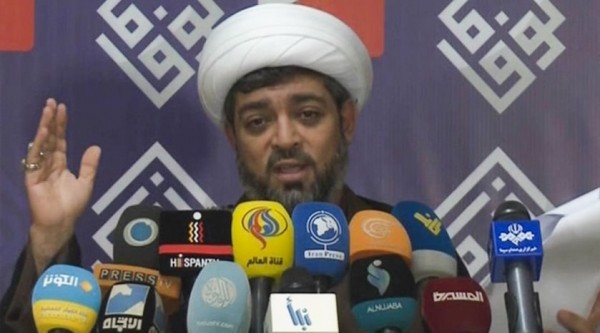Al-Wefaq Announces Failure of Elections: 30% Turnout at Most, Int’l Community Should Respect Bahraini People’s Will

2018-11-25 - 7:19 p
Bahrain Mirror: Al-Wefaq National Islamic Society declared in a press conference held by the Society's Deputy Secretary General, Sheikh Hussein Al-Daihi, on Saturday (November 24, 2018), that the parliamentary and municipal elections in Bahrain have failed miserably.
Al-Daihi said that the elections witnessed a popular boycott of the masses from both loyalists and opposition supporters, as the turnout, according to statistics and information, amounted to not more than 28% and 30%, challenging the authorities to reveal with full transparency the election results.
"We have recorded a participation rate that did not exceed 7% in some districts, while others not exceeding 8% in the northern governorate, and in electoral districts of the capital, participation did not exceed that rate as well," he said during his conference that took place in the Lebanese capital, Beirut.
Saluting the Bahraini people, Al-Daihi said: "You proved that you are unbreakable and can't be influenced by rhetoric. You made a national epic with great national cohesion. You proved that you are capable of making changes and shaping your bright future with this unprecedented determination."
He also addressed the international community, saying: "The people of Bahrain demonstrated today and through their wide boycott their strong will to achieve change and freedom as well as their categorical rejection of the falsification of the national will. The international community must respect this will and support the people of Bahrain to support their just and legitimate demands."
"You have failed, and you will fail even more," said Al-Daihi addressing the regime. "The people of Bahrain have dealt you a slap you will not forget."
The Deputy Secretary General highlighted that the Royal Court called yesterday at noon all the former and current ministers as well as a number of officials and told them to direct all their employees in governmental bodies to vote, due to the sensitivity of the situation, as there was a weak turnout since the majority of Bahrainis belonging both to the Sunni and Shiite sects refrained from voting
"The Bahraini Ministry of Foreign Affairs called many of the diplomatic missions and offered them services by taking them on a tour to specific electoral centers in the presence of media outlets, in order to show a diplomatic interest in elections on the one hand, and limit their movement by not showing them the vacant electoral centers on the other hand. However, there was no response from main diplomatic missions, according to information," he added.
Al-Daihi also spoke of a number of factors that "contributed to the failure of the electoral process." Among other things, he mentioned "the regime's failure to convince the international community of the legitimacy of the elections, and the refraining of professional and political figures from participation in the elections."
He went on to say that the regime failed to convince voters from the opposition and loyalists to participate, and resorted to methods of intimidation and threats against voters of various components of society, including students of the University of Bahrain, employees, housing applicants, retirement applicants, and all those in need, including the poor. He further stated that the regime resorted to pressuring public sector workers to vote, as was the case with the Ministry of Education, forced military personnel to vote, directing them to vote for specific candidates. He added that due to the crime of demographic change through political naturalization exercised by the authorities in Bahrain, a number of names were recorded belonging to Arab and foreign nationals running as parliamentary and municipal candidates as candidates in various districts, which caused public opinion dissatisfaction.
Al-Daihi stressed that the solution in Bahrain is reached through: the governance of the people, where the people are the source of all authorities through a consensual social contract, with the separation of powers, restriction of authority, building of a modern democratic state based on the rule of law, and the completely willful political participation of citizens in the political decision-making process.
"The national opposition forces have already shown this in several stages, by a group of documents and visions they proposed or announced such as the Manama Document and Bahrain Declaration (recently launched by Al-Wefaq), in addition to many political initiatives to find a solution and settle the dispute through peaceful methods, dialogue and negotiation as a principle for dealing with differences," Al-Daihi further stated.
- 2024-07-10Bahraini Authorities Summon Head of Sanabis Ma'tam, Threaten "Actions" Due to Mourners' Chants Against Israeli Occupation
- 2024-07-10Political Prisoner Mohammad Al-Raml's Family Say He's Vomiting Blood Due to Poor Conditions, Fear for His Life
- 2024-07-09Ali Al-Majed Arrested After His Return to Bahrain
- 2024-07-08Yusuf Al-Muhafdha: Convicted Returnees to Bahrain Have the Right to a Lawyer, Retrial, and Legal Guarantees
- 2024-07-08Reciter Mahdi Sahwan: Head of Manama Police Informed Me of Ban on Reciters Traveling to Commemorate Ashura